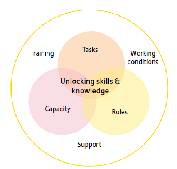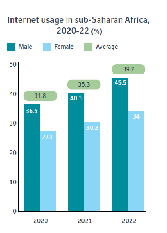While women play a key role in smallholder farming operations, the challenge of limited education and training requires the implementation of capacity building efforts to ensure the adoption of best
agricultural practices. In countries like Morocco, a promising organisational structure has emerged among female farmers through the establishment of cooperatives. A report from Morocco’s High Planning Commission in 2022 revealed that 73% of the 15m individuals outside the labour force were women, underscoring the potential for the integration of women in agriculture. Due to the variability of available machinery and agroecological conditions across Africa, however, a tailored approach to implement agronomic solutions is needed to effectively impart essential skills.
Lamfeddal Kouisni, director of the African Sustainable Agriculture Research
Institute (ASARI) – part of University Mohammed VI Polytechnic – stressed the importance of considering socio-economic factors when implementing agricultural solutions, including education and literacy levels, to maximise their effectiveness. As many women farmers might not have attended traditional classes or have limited exposure to formal training, it is crucial that training approaches be tailored to align with these realities, ensuring accessibility and affordability.
As part of the UN’s Women’s Empowerment through Climate-Resilient Agriculture programme, women’s cooperatives are receiving support to transition to conservation agricultural practices. This shift involves the introduction of climate-resilient agro-ecological techniques and the integration of renewable and energy-efficient technologies across value chains. A publication of the programme’s outcomes between 2017 and 2021 highlights that more than 17,000 women adopted climate-resilient agricultural production approaches across the region. Notably, 11,000 women in Mali were trained in soil restoration, water management, alternating crop systems, and the utilisation of organic fertilizer and natural pesticide. In Senegal, 1194 women effectively integrated practices and technologies following the training programme, including the development and marketing of climate-adapted rice seeds. Côte d’Ivoire saw 1927 women gain access to knowledge on organic and resilient techniques within the shea farming segment. In Nigeria, 2500 women smallholder rice farmers were trained in improved rice production technologies. Similarly, 690 women farmers in Niger successfully developed and adopted bio-pesticides using local products. These accomplishments highlight the impact of empowering women with climate-resilient skills and technologies, promoting sustainable and adaptable agricultural systems across the continent.
As many women farmers might not have attended traditional classes or have limited exposure to formal training, it is crucial that training approaches be tailored to align with these realities, ensuring accessibility and affordability.
Women farmers in Africa have shown resilience in the face of climate change by embracing climatesmart agricultural practices such as cultivating drought-resistant crops and utilising soilconservation techniques. Key projects have been realised in North Africa, where ASARI collaborates with cooperatives, organising workshops, delivering training and establishing field schools to showcase the efficacy of agronomic methods to address ecological challenges. For instance, the adoption of biosaline agriculture has emerged in regions where drought-induced aridity exacerbates soil salinity problems, while other areas face issues with soil acidity. Female farmers have embraced these
innovations, particularly when they see increased revenue streams. To foster widespread adoption, it is essential that farmers are provided with affordable access to effective solutions.


